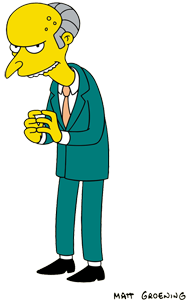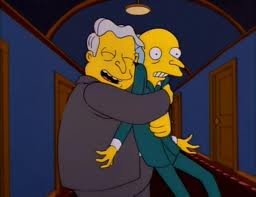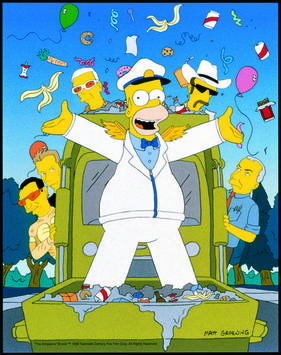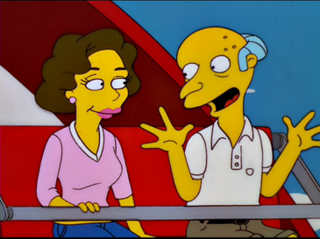| "The Trouble with Trillions" | |
|---|---|
| The Simpsons episode | |
| Episode no. | Season 9 Episode 20 |
| Directed by | Swinton O. Scott III |
| Written by | Ian Maxtone-Graham |
| Production code | 5F14 |
| Original air date | April 5, 1998 |
| Guest appearance | |
| |
| Episode features | |
| Chalkboard gag | "I will not demand what I'm worth" |
| Couch gag | The living room is a sauna, with three men in towels relaxing. The Simpsons (also in towels) arrive, but leave sheepishly as the three men glare at them. [1] |
| Commentary | Matt Groening Mike Scully George Meyer Ian Maxtone-Graham Swinton O. Scott III Matt Selman |
"The Trouble with Trillions" is the twentieth episode in the ninth season of the American animated television series The Simpsons . It originally aired on the Fox network in the United States on April 5, 1998. [2] It was written by Ian Maxtone-Graham and directed by Swinton O. Scott III. [2] The episode sees Homer being sent by the Federal Bureau of Investigation to try to obtain a trillion dollar bill that Mr. Burns failed to deliver to Europe during the post-war era.
All of Springfield celebrates the arrival of the New Year except for Ned Flanders, who instead focuses on filing his tax returns. A few months later, as all of Springfield rushes to send out their returns just before midnight on April 15, Homer realizes he did not file his. He rushes and provides false information before delivering it to the post office. However, at the IRS the somewhat spherical package containing Homer's tax returns bounces into a "Severe Audit" bin, and the government arrests him for tax fraud. To avoid prison, Homer agrees to help Agent Johnson of the FBI. With a hidden microphone under his shirt, Homer uncovers that his coworker Charlie is leading a militia planning to assault all government officials, and has him arrested by the FBI for conspiracy.
Impressed, Johnson reveals to Homer that in 1945, President Harry S. Truman printed a one trillion-dollar bill to help reconstruct post-war Western Europe and enlisted Montgomery Burns to transport the bill. However, it never arrived and the FBI suspects Burns still has it with him. Homer is sent in to investigate. At the Burns estate, Homer searches for the bill before Burns, who believes Homer is a reporter from Collier's magazine, reveals that he keeps it in his wallet. Johnson and Agent Miller burst in and arrest Burns, [3] who, insisting he's innocent, protests that the government oppresses the average American. Moved by Burns' speech, Homer knocks out the FBI agents and frees Burns.
The two men go to Smithers, who suggests they leave the country. Burns takes Smithers and Homer in his old plane, setting off to find an island and start a new country. The three land in Cuba and appear before Fidel Castro. Burns tries to buy the island, but Castro foils his plan when he asks to see the trillion-dollar bill and then refuses to give it back. Later, Burns, Smithers, and Homer are on a makeshift raft. Smithers asks whether Burns will be facing jail time; Burns replies that, if it is a crime to love one's country or steal a trillion dollars or bribe a jury, he is guilty. [2]
The episode was written by Ian Maxtone-Graham, though the original draft of the plot was much different. Originally, Homer was to learn that he was a Native American, and would try to exploit it to not have to pay taxes. The idea had been going well for a few days, but the staff did not actually know whether Native Americans had to pay taxes. When the writers found out that they did, the whole plot had to be scrapped. [4] Executive producer Mike Scully's brother Brian pitched the idea of the trillion-dollar bill, which they accepted, as they were out of ideas. [5]
The episode's title is a reference to the Star Trek episode "The Trouble with Tribbles". [6]
The scene where the FBI agent sits near Homer is a reference to the film JFK . [1]
While Homer, Mr. Burns, and Smithers are in Cuba, a billboard can be seen with a picture of Marxist revolutionary Che Guevara being used to advertise Duff Beer. [1]
In its original broadcast, "The Trouble with Trillions" finished 51st in ratings for the week of March 30–April 5, 1998, with a Nielsen rating of 7.5, equivalent to approximately 7.4 million viewing households. It was the third highest-rated show on the Fox network that week, following World's Wildest Police Videos and Melrose Place . [7]
Since airing, the episode has received mixed reviews from television critics. The authors of the book I Can't Believe It's a Bigger and Better Updated Unofficial Simpsons Guide, Warren Martyn and Adrian Wood, did not enjoy the episode, calling it, "Rather dull and unfunny", adding, "A mediocre episode at best that makes Burns out to be altruistic (which he's not) and very stupid in letting Castro have his money (which he so wouldn't)." [1] The Daily Telegraph characterized the episode as one of "The 10 Best Simpsons TV Episodes". [8] The article noted the episode contained "one of the few gags in comedy history about relying too heavily on surveillance photography in spying". [8]
Ian Jones and Steve Williams for Off the Telly criticized all of season 9 for lacking an episode that centered on Burns, as they consider Burns to be the crux of many good episodes, though they noted that "The Trouble with Trillions" came the closest, with Burns having a supporting role. [9] In a review of The Simpsons' ninth season, Isaac Mitchell-Frey of the Herald Sun described the episode as "brilliant", and highlighted it along with episodes "Bart Carny" and "The Joy of Sect". [10]
In the United Kingdom, the episode was screened on BBC Two in January 1999, before any other episode from season six or later were seen by viewers on the channel, as part of a night of Cuba-themed programming. [11] The episode had made its UK premiere in June 1998, by the program's primary rights holder in the country, Sky One.

Waylon Joseph Smithers Jr., usually referred to as Mr. Smithers, or simply Smithers, is a recurring character in the animated sitcom The Simpsons, voiced by Harry Shearer. He first appeared in "Homer's Odyssey", although his voice could be heard in the series premiere "Simpsons Roasting on an Open Fire". He is the consummate executive and personal assistant of Springfield Nuclear Power Plant's owner Mr. Burns, and is usually treated unfairly.

Charles Montgomery Plantagenet Schicklgruber "Monty" Burns, usually referred to as Mr. Burns or C. Montgomery Burns, is a recurring character in the animated television series The Simpsons, voiced initially by Christopher Collins and currently by Harry Shearer. He is the mostly evil, devious, greedy, and wealthy owner of the Springfield Nuclear Power Plant and, by extension, Homer Simpson's boss. He is assisted at almost all times by Smithers, his loyal and sycophantic aide, adviser, confidant, and secret admirer. He is between 81 and 120 years old, though sometimes it's implied he's much older.

"Burns, Baby Burns" is the fourth episode of the eighth season of the American animated television series The Simpsons. It originally aired on the Fox network in the United States on November 17, 1996. In the episode, Mr. Burns reunites with his long-lost son Larry. At first, they get along well, but Mr. Burns soon realizes that his son is an oaf. The episode was directed by Jim Reardon and is the first one written by Ian Maxtone-Graham. The episode guest starred Rodney Dangerfield as Larry Burns.

"The City of New York vs. Homer Simpson" is the first episode of the ninth season of the American animated television series The Simpsons. It was originally broadcast on the Fox network in the United States on September 21, 1997, as the 179th episode of the series. The episode features the Simpson family traveling to Manhattan to recover the family car, which was taken by Barney Gumble and abandoned outside the World Trade Center, where it had been repeatedly posted with parking tickets, and disabled with a parking boot.
"Treehouse of Horror X" is the fourth episode of the eleventh season of the American animated television series The Simpsons, and the tenth annual Treehouse of Horror episode, consisting of three self-contained segments. It first aired on the Fox network in the United States on Halloween 1999. In "I Know What You Diddily-Iddily-Did", the Simpsons cover up a murder and are haunted by an unseen witness. In "Desperately Xeeking Xena", Lisa and Bart gain superpowers and must rescue Xena star Lucy Lawless from the Comic Book Guy's alter ego The Collector, and in "Life's a Glitch, Then You Die", Homer causes worldwide destruction thanks to the Y2K bug.
"Tennis the Menace" is the twelfth episode of the twelfth season of the American animated television series The Simpsons. It originally aired on the Fox network in the United States on February 11, 2001. In the episode, the Simpsons build a tennis court in their backyard and are ridiculed by the entire town because of Homer's inferior tennis ability. Homer therefore tries to please Marge by entering the two into a tournament, but they quickly turn into rivals when Marge replaces Homer with Bart as her partner.
"The Great Money Caper" is the seventh episode of the twelfth season of the American animated television series The Simpsons. It first aired on the Fox network in the United States on December 10, 2000. In the episode, Homer, along with his son Bart, con people out of their money in order to pay for Homer's broken car. However, after having paid for the repairs, the two decide to continue grifting, which leads to some troublesome situations.
"Simpsons Tall Tales" is the twenty-first and final episode of the twelfth season of the American animated television series The Simpsons. It originally aired on the Fox network in the United States on May 20, 2001. In the episode, Homer refuses to pay a five dollar airport tax to fly to Delaware, which forces the family to ride in a livestock car of a train instead. There they meet a singing hobo who tells three tall tales which include Homer as Paul Bunyan, Lisa as Connie Appleseed and Bart and Nelson as Tom Sawyer and Huckleberry Finn respectively.
"Homer Simpson in: 'Kidney Trouble'" is the eighth episode of the tenth season of the American animated television series The Simpsons. It first aired on the Fox network in the United States on December 6, 1998. In the episode Grampa's kidneys explode, leaving him in urgent need of a donor. His son Homer initially agrees to donate one of his kidneys, but after hearing of side effects of only having one kidney, he begins to have second thoughts about the operation.
"Maximum Homerdrive" is the seventeenth episode of the tenth season of the American animated television series The Simpsons. It first aired on Fox in the United States on March 28, 1999. In the episode, Homer challenges trucker Red Barclay to a meat eating contest, of which Barclay is the long-standing champion. Barclay wins but quickly dies of "beef poisoning", marking the first time he will miss a delivery at his job. Feeling bad for him, Homer take on the duty of transporting Barclay's cargo from Springfield to Atlanta.
"Monty Can't Buy Me Love" is the twenty-first episode of the tenth season of the American animated television series The Simpsons. It first aired on the Fox network in the United States on May 2, 1999. In the episode, Mr. Burns is jealous of megastore owner Arthur Fortune, who is beloved by the people of Springfield. In order to win the people's love, Burns gathers the help of Homer Simpson, Professor Frink and Groundskeeper Willie to capture the Loch Ness monster.
"Last Tap Dance in Springfield" is the twentieth episode of the eleventh season of the American animated television series The Simpsons. It originally aired on the Fox network in the United States on May 7, 2000. In the episode, Lisa decides to sign up for tap dancing lessons after being inspired by a film about a girl who enters a tango contest and wins. Meanwhile, Bart and Milhouse hide out at the mall to escape going to summer camp. "Last Tap Dance in Springfield" was written by Julie Thacker, who based it on her own experiences with dance classes.
"It's a Mad, Mad, Mad, Mad Marge" is the twenty-first and penultimate episode of the eleventh season of the American animated television series The Simpsons. It first aired in the United States on the Fox network on May 14, 2000. After a failed marriage attempt with Otto, Becky stays with the Simpson family. However, Marge begins to get paranoid at her family's newfound love of Becky, and begins to think that she is seducing Homer.

"The Blunder Years" is the fifth episode of the thirteenth season of the American animated television series The Simpsons. It originally aired on the Fox network in the United States on December 9, 2001. The episode sees Homer, after being hypnotized by the hypnotist Mesmerino while having dinner at the restaurant Pimento Grove, reminded by a repressed traumatic experience from his childhood, including the moment he discovered the dead body of Waylon Smithers' father while having a fun at an abandoned mine. The Simpsons set out to find the corpse that triggered Homer's psychological trauma, which evolves into a murder mystery later in the episode.

"Trash of the Titans" is the twenty-second episode of the ninth season of the American animated television series The Simpsons. The 200th episode of the series overall, it originally aired on the Fox network in the United States on April 26, 1998. The episode, which was written by Ian Maxtone-Graham and directed by Jim Reardon, sees Homer Simpson run for the job of Springfield's Sanitation Commissioner. Steve Martin guest stars as Ray Patterson, the incumbent commissioner, while U2 play themselves after requesting an appearance on the show.
Ian Maxtone-Graham is an American television writer and producer. He has formerly written for Saturday Night Live (1992–1995) and The Simpsons (1995–2012), as well as serving as a co-executive producer and consulting producer for the latter.

"A Hunka Hunka Burns in Love" is the fourth episode of the thirteenth season of the American animated television series The Simpsons. It first aired on the Fox network on December 2, 2001. In the episode, Mr. Burns falls in love with Gloria, a woman who is much younger than he is and who turns out to be Snake Jailbird's ex-girlfriend.

"Mother Simpson" is the eighth episode of the seventh season of the American animated television series The Simpsons. It first aired on the Fox network in the United States on November 19, 1995. After faking his own death to get a day off work, Homer reunites with his mother Mona, whom he thought had died over two decades prior. It was directed by David Silverman and was the first episode to be written by Richard Appel. Glenn Close makes her first of eleven guest appearances as Homer's mother. This episode is dedicated to the memory of staff member Jackie Banks, who died on 4 November 1995.
"Homer the Smithers" is the seventeenth episode of the seventh season of the American animated television series The Simpsons. It originally aired on the Fox network in the United States on February 25, 1996. In the episode, Smithers takes a vacation and hires Homer to temporarily replace him as Mr. Burns' assistant.